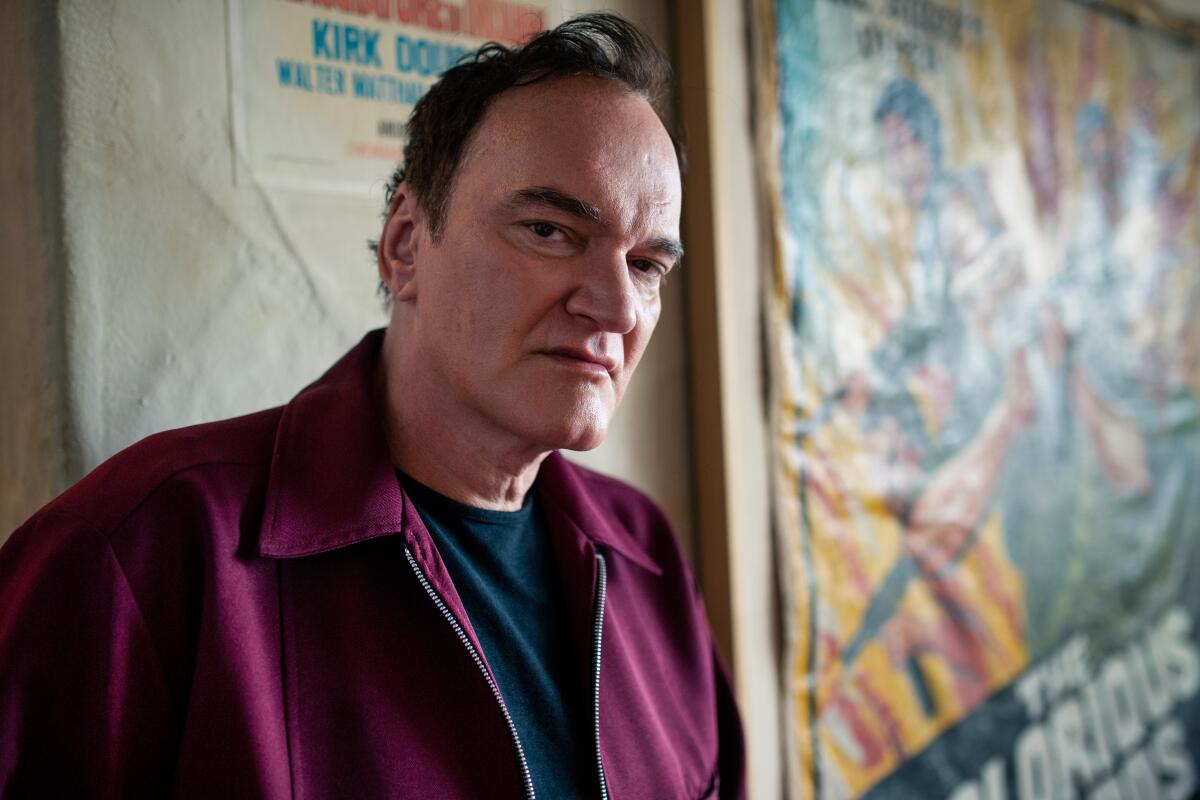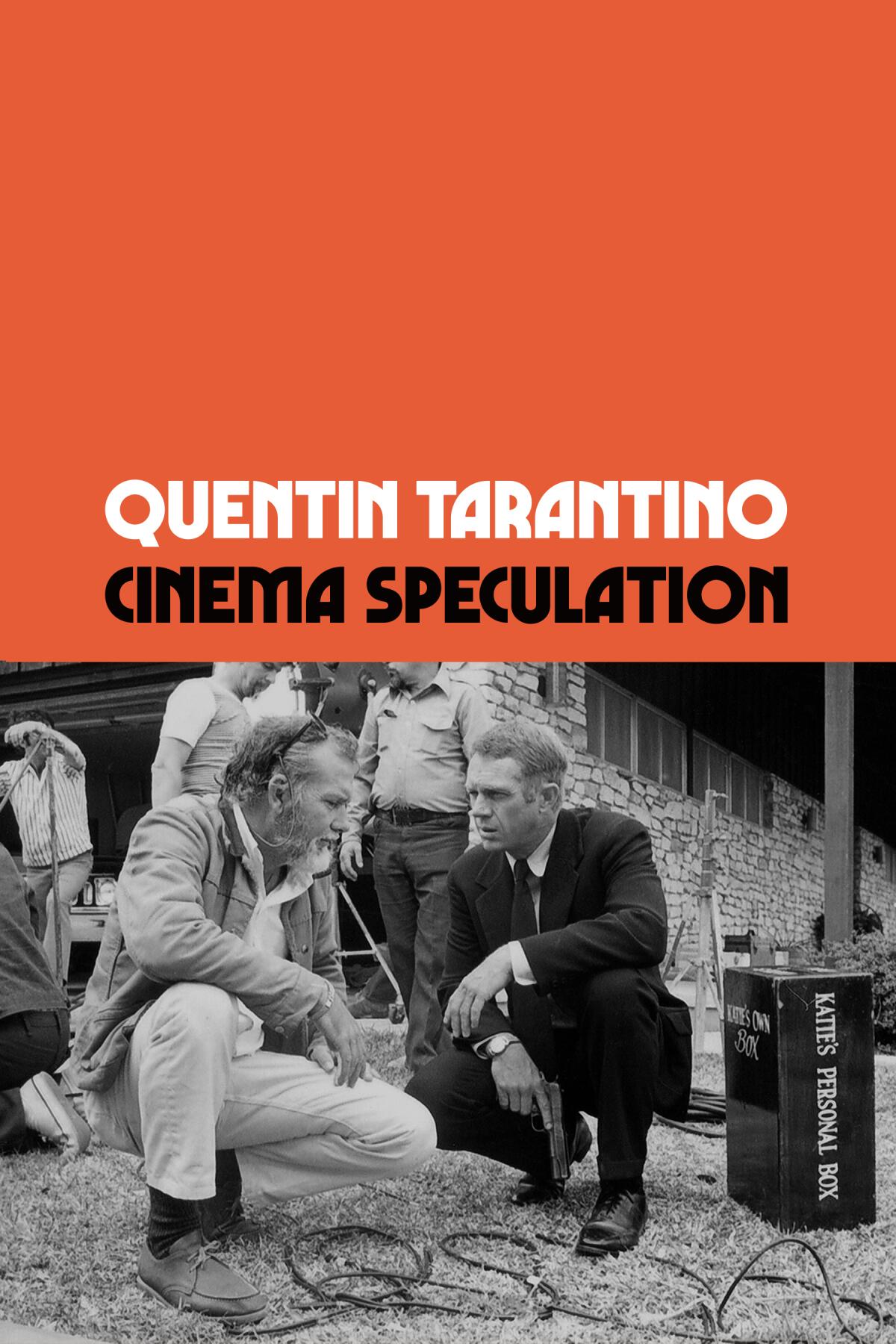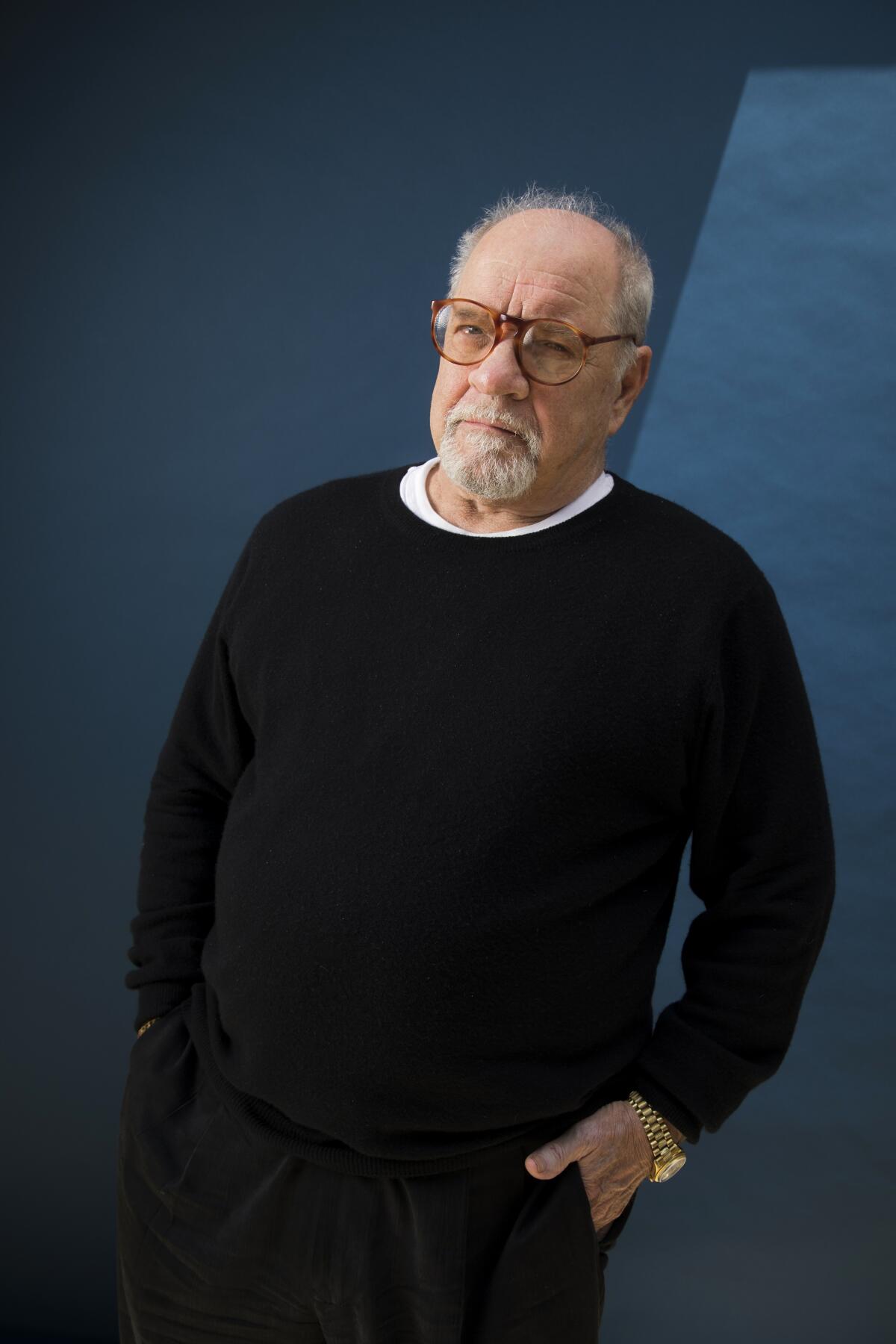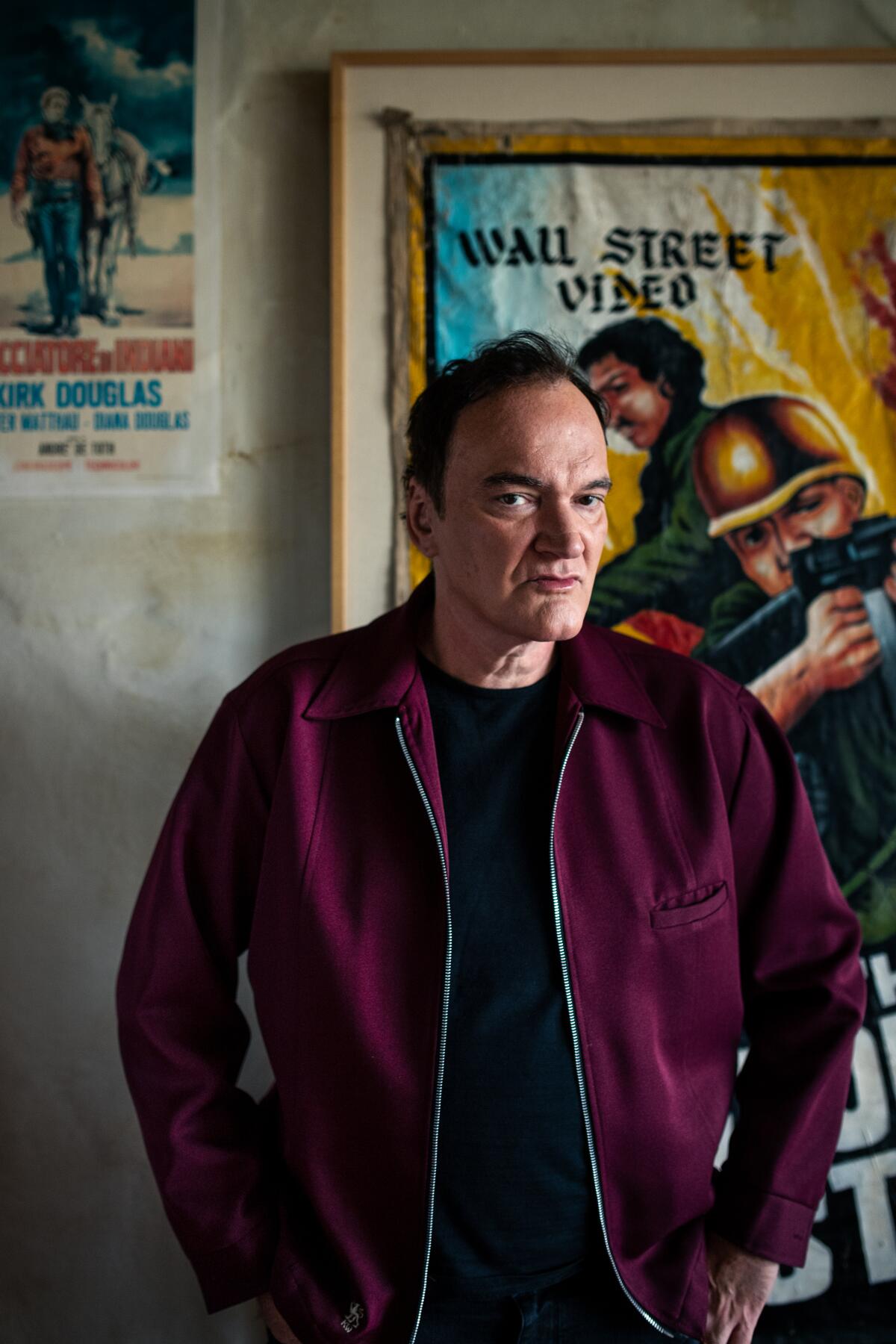Sign up for our Book Club newsletter
Get the latest news, events and more from the Los Angeles Times Book Club, and help us get L.A. reading and talking.
You may occasionally receive promotional content from the Los Angeles Times.

On the Shelf
Cinema Speculation
By Quentin Tarantino
Harper: 400 pages, $35
If you buy books linked on our site, The Times may earn a commission from Bookshop.org, whose fees support independent bookstores.
Quentin Tarantino is brewing some coffee and it is, as Samuel L. Jackson’s “Pulp Fiction” hit man would enthuse, “some serious gourmet s—,” served in a mug bearing the logo of his podcast “Video Archives,” named after the Manhattan Beach video store where Tarantino worked in his early 20s before becoming a filmmaker.
We’re settling into the library of Tarantino’s Hollywood Hills home, though pretty much any room in this spacious, multilevel mansion could technically qualify as a library. There are piles of film books and magazines in nearly every corner and on every surface, rows of vinyl record albums snaking across the carpeted and tiled floors, metal carts overflowing with VHS tapes just off the kitchen, revolving racks of comic books clamoring for attention. And we haven’t even ventured into the guest house, where Tarantino stores a vast collection of magazine and newspaper clippings. It’s not “Hoarders” — there’s too much floor space — but, safe to say, the man will never want for entertainment.
It’s Halloween, and Tarantino’s wife, Daniella, and their two children are home in Tel Aviv, where the family spends part of its time during the year. Left to his own devices, Tarantino has been going through his horror movie collection, making a little stack to watch later that evening. These are films he hasn’t viewed since they came out, like the 1977 supernatural thriller “The Sentinel,” and others he has never seen at all (“perhaps for good reason,” he says, laughing) like “Man’s Best Friend,” which has Ally Sheedy unwittingly adopting a genetically altered dog.
Neither of these movies is mentioned in Tarantino’s new book, “Cinema Speculation,” though the volume, the first work of nonfiction from the 59-year-old filmmaker, is full of references and reveries to other genre movies (Tobe Hooper’s slasher flick “The Funhouse,” the vigilante thriller “Rolling Thunder”) as well as musings on those more generally accepted as classics, including “Bullitt” and “Dirty Harry.” There’s a chapter pondering what “Taxi Driver” might have looked like had Brian De Palma directed it instead of Martin Scorsese. (De Palma was the first to read Paul Schrader’s screenplay.) There’s even an appreciation of longtime Los Angeles Times film critic Kevin Thomas, whose enthusiastic reviews of exploitation movies captivated Tarantino as a young reader.
“He seemed like one of the few practitioners who truly enjoyed their job, and consequently, their life,” Tarantino writes, adding that Thomas’ appreciative review of Robert Forster in the 1980 “Jaws” ripoff “Alligator” stuck with him through the years — leading him to cast the veteran actor in “Jackie Brown.”
Tarantino saw all the films he writes about in “Cinema Speculation” as a kid, often at an age that might strike some as wildly inappropriate. He brags about seeing a double feature of “The Wild Bunch” and “Deliverance” when he was 11. Movies were then (and remain to this day) everything to Tarantino, and the book is often as much about his experiences watching them — at a grindhouse like the Carson Twin Cinema or maybe the second-run Paradise Theater in Westchester — as the films themselves.
Asked if there were any movies that maybe he should not have seen as a kid, Tarantino recalls asking to leave the theater during “Bambi” after Bambi’s mother was shot and the forest fire began.

“I think ‘Bambi’ is well known for traumatizing children,” Tarantino says. “It’s a cliché, but it’s true. The only other movie I couldn’t handle and had to leave was at a drive-in in Tennessee. I was there alone, sitting on the gravel by a speaker, watching Wes Craven’s ‘Last House on the Left.’ So for me, ‘Last House on the Left’ and ‘Bambi’ are sitting on the f— shelf right next to each other.” He laughs. “Both take place in the woods, and both had me saying, ‘I gotta get out of here!’”
Tarantino has been thinking about writing “Cinema Speculation” for years. The book evolved, he says, from being a mere appreciation of his favorites to a survey of films that inspired a “point of view worth talking about.”
“Doing this made me respect the professionals of film criticism even more for the simple fact that I realized I couldn’t do what they do,” Tarantino says. “If my job was to go and watch the new movies every week and then write what I thought, I can’t imagine I would have anything to say about everything, other than offer a plot summary and a ‘good,’ ‘bad,’ ‘indifferent’ verdict. With the book, I wanted to find something quirky that’s interesting and worth talking about.”
Shortly after filmmaker Quentin Tarantino appeared at a New York march protesting police brutality on Oct. 24, police groups across the country began calling for a boycott of his next movie, “The Hateful Eight,” taking issue with the remarks Tarantino made that day.
And so the chapter on “Taxi Driver” emphasizes the groundwork laid for it by Charles Bronson’s “Death Wish.” (Tarantino recalls seeing the 1976 Scorsese-directed movie with a raucous audience at the Carson Twin, hardly the kinds of cineastes who revere it today.) Filmmakers De Palma, Don Siegel and Schrader become characters of a sort, moving through the book and Tarantino’s young life. In fact, there was so much Schrader at one point that Tarantino decided to remove a chapter devoted to his 1974 Japanese gangster homage, “The Yakuza.”
“If I kept that, I would have needed Paul to write a foreword to the book,” Tarantino says, laughing.
Asked why he landed on Schrader, known for films centered on tormented men and their righteous fury, Tarantino paused for a moment.

“I don’t want to be the one to break down his theme in a sentence, but inarticulately: lonely men with nothing but a profession existing in four walls,” Tarantino says. “And sometimes those four walls are their apartment, sometimes they’re a city, sometimes they’re the f— planet Earth. Sometimes it’s just other human beings and how they bump up against the four walls until, usually, there’s blood all over them.”
The movies in “Cinema Speculation” have a fair amount of blood-splattering moments, as you’d expect from the filmmaker who created “Reservoir Dogs,” “Pulp Fiction,” “Once Upon a Time ... in Hollywood,” “Kill Bill” ... I could keep running through the filmography, but you get the point. But there are also — and this is equally true to his oeuvre — plenty of laugh-out-loud jokes. Tarantino calls them “snarky little asides out of the corner of my mouth,” and they usually arrive in a parenthetical, such as when he muses that, just as ’60s antiestablishment auteurs rejoiced when studio musical adaptations fell out of favor, today’s filmmakers “can’t wait for the day they can say that about superhero movies.”
“The analogy works because it’s a similar chokehold,” Tarantino says.
Martin Scorsese expanded on his controversial Marvel movies comments in a lengthy op-ed, and “Spiderverse” director Peter Ramsey agreed — sort of.
But when can we expect the tide to turn? “The writing’s not quite on the wall yet,” he says, “the way it was in 1969 when it was, ‘Oh, my God, we just put a bunch of money into things that nobody gives a damn about anymore.’”
And yet, so many auteurs have made superhero films. I ask him why he never has raised his hand for a Marvel or DC Comics flick, even though I know the answer. Sometimes it’s just fun to hear him say it.
“You have to be a hired hand to do those things,” Tarantino says. “I’m not a hired hand. I’m not looking for a job.”

Tarantino was 14 when “Star Wars” came out in 1977 and changed movies forever — pretty much the perfect age to have his mind blown. But there’s barely a mention of George Lucas’ space opera in the book, certainly nothing approaching what he writes about “Jaws,” which, when it arrived in theaters in 1975, “might not have been the best film ever made. But it was easily the best movie ever made.”
“Of course, I liked ‘Star Wars.’ What’s not to like?” Tarantino says. “But I remember — and this is not a ‘but’ in a negative way but in a good way. The movie completely carried me along and I was just rocking and rolling with these characters. ... When the lights came on, I felt like a million dollars. And I looked around and had this moment of recognition, thinking, ‘Wow! What a time at the movies!’
“Now, that’s not necessarily my favorite exact type of film,” he continues. “At the end of the day, I’m more of a ‘Close Encounters [of the Third Kind]’ guy, just the bigger idea and Spielberg setting out to make an epic for regular people, not just cinephiles. Few films had the kind of climax that ‘Close Encounters’ had. It blew audiences away.”
With the release of the final chapter of the Skywalker saga, “Star Wars: The Rise of Skywalker” on the horizon, we, the nerds of the Los Angeles Times, set out to make something comprehensive about the eight movies in the Skywalker saga released so far.
You don’t need Quentin Tarantino to tell you that “Star Wars” is an enjoyable romp or that “Close Encounters” is a masterpiece. (For the record, he ranks both movies behind Ridley Scott’s “Alien” today.) More intriguing, though, is the case “Cinema Speculation” makes for “Rolling Thunder” being a “deeper depiction of the casualties of war than the contrite ‘Coming Home.’” Or the way the entire project evokes a pre-internet time when you had to look far and wide to find someone taking genre movies seriously.
“There was a guy at the [Los Angeles] Herald Examiner, David Chute, and he was an expert on Hong Kong films, Japanese genre movies, stuff like that,” Tarantino remembers. “And there was a time when David Chute was the only person writing about genre in that kind of experienced way in a regular publication that would go out in everyone’s homes. Now, everybody trying to be hip and cool is trying to write like David Chute. There’s nothing bad about that; in fact, there’s everything good about it. But there was this point where he was this lone voice by himself. Little did we know that that one voice would become the critical voice of the internet.”
Sign up for our Book Club newsletter
Get the latest news, events and more from the Los Angeles Times Book Club, and help us get L.A. reading and talking.
You may occasionally receive promotional content from the Los Angeles Times.